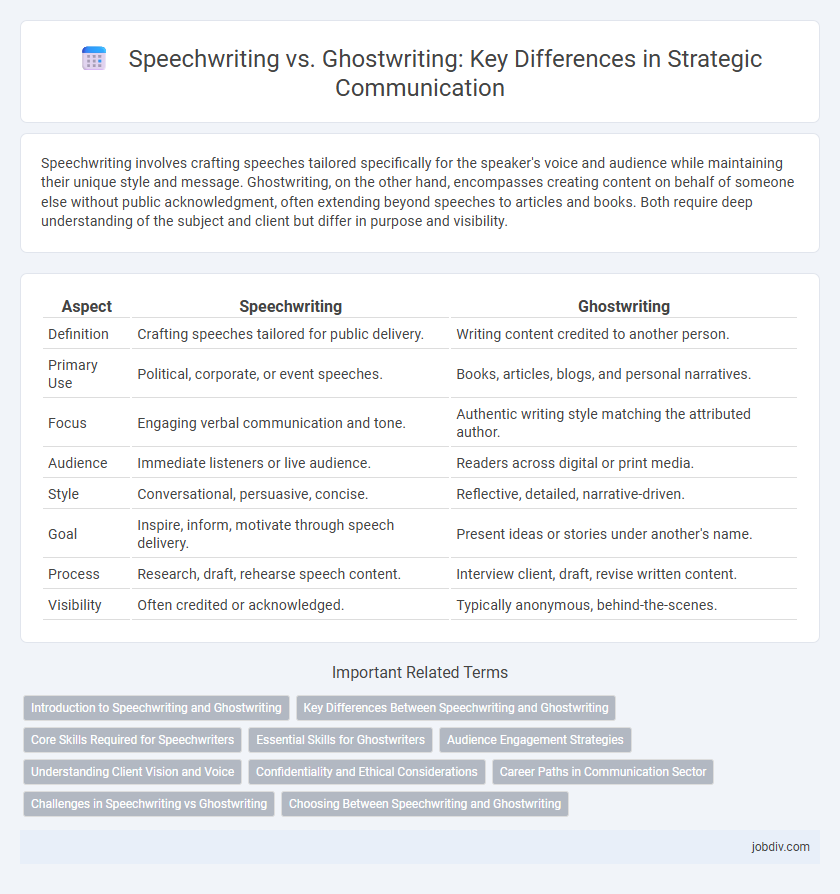Speechwriting involves crafting speeches tailored specifically for the speaker's voice and audience while maintaining their unique style and message. Ghostwriting, on the other hand, encompasses creating content on behalf of someone else without public acknowledgment, often extending beyond speeches to articles and books. Both require deep understanding of the subject and client but differ in purpose and visibility.
Table of Comparison
| Aspect | Speechwriting | Ghostwriting |
|---|---|---|
| Definition | Crafting speeches tailored for public delivery. | Writing content credited to another person. |
| Primary Use | Political, corporate, or event speeches. | Books, articles, blogs, and personal narratives. |
| Focus | Engaging verbal communication and tone. | Authentic writing style matching the attributed author. |
| Audience | Immediate listeners or live audience. | Readers across digital or print media. |
| Style | Conversational, persuasive, concise. | Reflective, detailed, narrative-driven. |
| Goal | Inspire, inform, motivate through speech delivery. | Present ideas or stories under another's name. |
| Process | Research, draft, rehearse speech content. | Interview client, draft, revise written content. |
| Visibility | Often credited or acknowledged. | Typically anonymous, behind-the-scenes. |
Introduction to Speechwriting and Ghostwriting
Speechwriting involves crafting speeches tailored to a speaker's voice, purpose, and audience, emphasizing clarity and persuasive messaging for impactful communication. Ghostwriting entails writing content on behalf of someone else, allowing the client to present ideas authentically without revealing the writer's involvement. Both practices require deep understanding of language nuances and audience engagement strategies to effectively deliver the intended message.
Key Differences Between Speechwriting and Ghostwriting
Speechwriting involves crafting speeches tailored to a speaker's voice, purpose, and audience, emphasizing clarity, persuasion, and engagement. Ghostwriting focuses on producing written content such as articles, books, or blogs on behalf of another person, capturing their tone and intent while maintaining anonymity. Key differences include the medium--spoken word versus written text--and the distinct objectives of influencing live audiences versus readers.
Core Skills Required for Speechwriters
Speechwriters require exceptional skills in rhetoric, persuasive writing, and audience analysis to craft impactful and memorable speeches. Mastery of tone modulation, clarity, and storytelling enables them to align the message with the speaker's voice and objectives effectively. Unlike ghostwriting, speechwriting demands a deep understanding of oral delivery dynamics to ensure the speech resonates and engages live audiences.
Essential Skills for Ghostwriters
Mastering the art of ghostwriting demands exceptional writing skills, an ability to capture the client's unique voice, and deep research capabilities to ensure authenticity and credibility. Ghostwriters must excel in adaptability and confidentiality, tailoring content to diverse audiences while maintaining strict privacy about their involvement. Proficiency in storytelling and persuasive communication further distinguishes ghostwriters, enabling them to craft compelling narratives that resonate effectively across various platforms.
Audience Engagement Strategies
Speechwriting incorporates rhetorical techniques such as storytelling, emotional appeals, and clear calls to action to captivate the audience and maintain attention throughout the presentation. Ghostwriting emphasizes tailoring content to reflect the speaker's voice and personality, enhancing authenticity and connection with listeners. Both fields prioritize audience engagement by carefully crafting messages that resonate with the target demographic's values and expectations.
Understanding Client Vision and Voice
Speechwriting requires deep insight into the client's vision and voice to craft messages that resonate authentically with the audience. Ghostwriting involves capturing the client's tone and personality in written form, ensuring the content reflects their unique perspective. Both practices demand effective communication skills to translate ideas into compelling narratives that align with the client's goals.
Confidentiality and Ethical Considerations
Speechwriting demands strict adherence to confidentiality, as the content often involves sensitive personal or organizational information that must remain protected. Ghostwriting also requires ethical integrity, ensuring that the writer accurately represents the speaker's voice without misattributing authorship. Both practices navigate complex ethical considerations surrounding transparency, authorship, and trust between the writer and client.
Career Paths in Communication Sector
Speechwriting and ghostwriting both offer dynamic career paths within the communication sector, each requiring distinct skill sets in persuasive language and audience analysis. Speechwriters often collaborate closely with executives and politicians to craft impactful messages that align with public relations strategies and brand identity. Ghostwriters typically serve authors, public figures, and corporate leaders by creating compelling, voice-authentic content, making them essential in personal branding and content marketing.
Challenges in Speechwriting vs Ghostwriting
Speechwriting presents unique challenges including capturing the speaker's authentic voice, tailoring messages to diverse audiences, and ensuring speeches are engaging and memorable under time constraints. Ghostwriting demands deep understanding of the subject's expertise and style while maintaining confidentiality and crafting content that seamlessly aligns with the subject's public persona. Both fields require exceptional research, adaptability, and audience insight, but speechwriting often deals more directly with performance dynamics and live delivery nuances.
Choosing Between Speechwriting and Ghostwriting
Choosing between speechwriting and ghostwriting depends on your communication goals and desired level of personal voice. Speechwriting focuses on crafting spoken messages tailored for live delivery, emphasizing tone, rhythm, and audience connection, while ghostwriting involves creating written content that reflects the client's style for formal publications or online presence. Evaluating the context, audience expectations, and purpose of the communication ensures the most effective and authentic expression of ideas.
Speechwriting vs Ghostwriting Infographic

 jobdiv.com
jobdiv.com